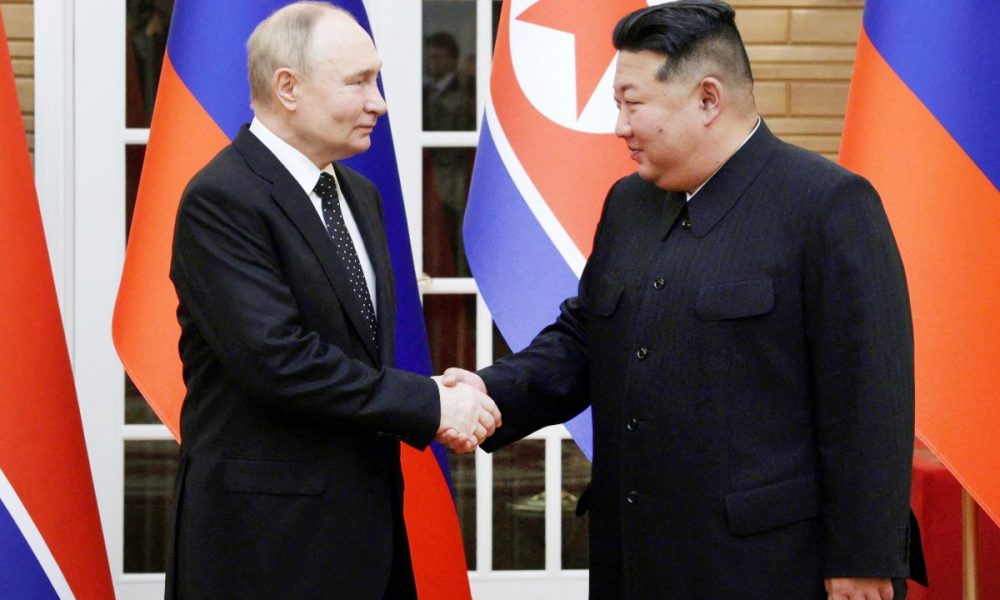Russian President Vladimir Putin recently concluded a historic visit to North Korea, where he and the nation’s supreme leader, Kim Jong Un, signed a "comprehensive strategic partnership agreement." This pact encompasses several critical elements, most notably provisions for mutual military assistance in emergencies affecting either Russia or North Korea. The alliance, formalized through this agreement, represents a profound shift in geopolitical allegiances and poses significant implications for global security, particularly in East Asia.
The consolidation of this Moscow-Pyongyang alliance is alarming not only due to its impact on the ongoing conflict in Ukraine but also for the broader implications it holds for regional stability. Both Putin and Kim are notorious for their aggressive military strategies; Putin persists with his invasion of Ukraine, while Kim accelerates the advancement of North Korea’s nuclear and missile capabilities. Such collaboration between two nuclear-armed despotic regimes heightens regional tensions and poses substantial risks to neighboring countries, notably Japan.
This development is particularly precarious as it adds a new dimension of threat to potential conflicts involving Taiwan or the Korean Peninsula. The strategic calculus for Japan must now account for the heightened risk from these neighboring adversaries. Japan’s Prime Minister Fumio Kishida and his administration must rigorously assess and adapt to these emerging threats. It is crucial for the Japanese government to not only bolster its defensive posture in the north but also to communicate the gravity of the situation to the public to ensure widespread awareness and preparedness.
Reassessing Japan’s Defense Needs
Given the newfound military alliance between Russia and North Korea, Japan must urgently reassess its defense strategies. Both nations have repeatedly demonstrated their willingness to flout international law. For Japan, whose security is already challenged by proximity to these rogue states, the dangers of this military collusion are profound and cannot be overstated.
The alliance formalized through this agreement is comprehensive and robust. According to the detailed provisions of the treaty, any threat or actual armed invasion on either Russia or North Korea would trigger immediate consultations and concrete measures to neutralize the threat. In the event of an armed invasion, the treaty stipulates that both nations will provide all necessary military and other forms of assistance under the right of collective self-defense, as enshrined in Article 51 of the United Nations Charter.
Similarities with the 1961 Treaty
Remarkably, the terms of this new agreement echo the 1961 Soviet-North Korean Treaty of Friendship, Cooperation, and Mutual Assistance, which lapsed when Russia normalized relations with South Korea. This new alliance effectively resurrects and modernizes the old treaty, signifying a strategic pivot after 26 years. Putin’s acknowledgment of potential military technology cooperation with North Korea and Kim’s emphasis on the elevated status of this bilateral relationship underscore the deepening military collaboration between the two nations. This partnership inevitably escalates the pressure on Japan to enhance its deterrent capabilities.
Strengthening Japan’s Deterrence
Japan must now place greater emphasis on addressing the threat from North Korean missile attacks and potential crises on the Korean Peninsula. In a scenario where North Korea launches missile attacks or other provocations, Japan’s Self-Defense Forces (SDF) may be compelled to deploy in defense. This situation could easily be aggravated by Russian military actions, complicating Japan’s defense strategy.
Moreover, the strategic dynamics could shift dramatically if China were to invade Taiwan, with potential Russian military provocations likely to follow. Russia’s military collaboration with North Korea creates additional risks, particularly if Pyongyang engages in diversionary tactics aimed at destabilizing Japan or other allied nations, including the United States and South Korea.
Chief Cabinet Secretary Yoshimasa Hayashi recently highlighted the government’s deep concern regarding the implications of the Russia-North Korea treaty for Japan’s security environment. These concerns necessitate actionable measures. The Kishida administration has already revised key security documents and adopted a pragmatic approach to building Japan’s defense capabilities. However, the burgeoning Russia-North Korea alliance demands a flexible and robust review of Japan’s defense needs, emphasizing real, practical capabilities in response to these emergent threats.
Heightened Global Concerns
The alliance is also likely to fuel Russia’s ongoing invasion of Ukraine. U.S. Secretary of State Antony Blinken has pointed out that Putin’s visit to North Korea was likely geared towards securing weapons and other military resources necessary for continuing the aggression in Ukraine. North Korea has reportedly already supplied Russia with millions of artillery shells and guided missiles, receiving advanced technology in fields such as spy satellites and rockets in return. This reciprocal exchange of arms and technology further complicates the international security landscape.
Disruption to World Peace
The procurement of arms by Russia from North Korea blatantly violates UN Security Council resolutions, which Russia has also endorsed. North Korea’s expressed full support for Russia’s actions in Ukraine at the recent summit ominously suggests that furthering military cooperation will continue unabated. If North Korea interprets the new treaty as grounds for collective self-defense, it could lead to increased military support for Russia, including the dispatch of North Korean troops to conflict zones.
The international community must unequivocally condemn this military collaboration, as it undercuts global peace and security. Prime Minister Kishida should leverage every available platform to candidly discuss the threats posed by this alliance and outline Japan’s strategic response to these evolving challenges.
Related:
Author: Editorial Board, The Sankei Shimbun
